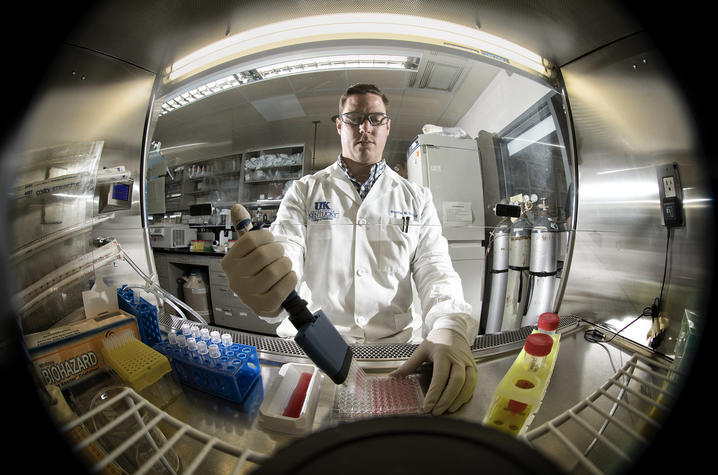Research Enhances Traditional Undergraduate Education
LEXINGTON, Ky. (Aug. 25, 2017) — As a land grant university, the University of Kentucky is committed to the advancement of knowledge through research. Even undergraduate students contribute significantly to that mission.
Students of any major, background and skill level have the opportunity to work with professors from all over UK, whether in labs, on faculty projects or even on independent projects that they design themselves.
“For those undergraduates who are interested in building faculty mentorships, gaining critical thinking and presentation skills and deepening their understanding of the subjects that interest them, the UK Office of Undergraduate Research (UGR) is there to help them along the way,” said Evie Russell, assistant director of the UK Office of Undergraduate Research.
Undergraduate students are encouraged to drop by the UGR office in Room 211 Funkhouser Building for help connecting with faculty mentors; creating and printing posters for presentations; and finding funding to continue or present their work. The staff at UGR works with students to help them capitalize on the benefits of doing research at the undergraduate level.
For a sneak peek at the world of research UK offers to undergraduate students, visit a UGR Information Session, scheduled 5-6 p.m. Tuesday Aug. 29 in Room 200 Funkhouser Building. An additional information session is scheduled Oct. 26. Visit the UGR website at www.uky.edu/chellgren/undergraduate-research for more information.
Undergraduate research “benefits include opportunities to present and/or travel abroad for research; gaining crucial credit-hours toward graduation; acquiring skills and knowledge that will be beneficial in the workplace or graduate school; and developing personal and intellectual maturity that translates to all aspects of life,” said Russell said.
Faculty mentorships are often the most valuable aspect of undergraduate research, but finding a mentor can be challenging. Shiza Arshad, a UK alumna of the international studies, Chinese, and gender and women’s studies departments, who is now working for a nonprofit, reflects on her research mentors.
“While doing the research, I worked closely with such great professors, who have done so much in their lives and are so great and intellectually enlightening. It’s scary, almost, and intimidating, but they are so willing to help you, and they want to mentor you,” Arshad said.
Professors are often willing to train students to work in labs or on projects; advise them on their independent work; and guide them into suitable post-graduate opportunities. The UGR office provides resources to students looking for a mentor and gives advice on how to cope with the intimidating task of approaching them.
Contrary to popular belief, research is not only conducted in science, technology, engineering and mathematics (STEM) labs. Research is being performed in every department on campus, and undergraduates can contribute to all fields of knowledge.
Alexander Parmley, who majored in English and philosophy at UK, secured travel funding through UGR’s research abroad scholarship. He used it to go to Costa Rica to document indigenous groups there.
“Definitely, once I was in Costa Rica it was incredibly independent,” said the aspiring filmmaker of the personal benefits of doing research abroad. “I thought I had made a terrible mistake because I was struggling with the Spanish, but within a week it was great. I think I’m fluent (in Spanish) now.”
In fact, increased independence and personal intellectual growth is a common theme among undergraduate researchers. Curtis Bethel, a senior chemical engineering major on the pre-medical track, said that his favorite part of doing research is “learning to brainstorm ideas in directions that no one has ever thought before. The ability to think independently and infer information from results is an invaluable skill that I developed during my experience. It is a type of thinking that cannot be developed through lectures, shadowing or even in class laboratories.”
Charles Hapole, a current doctoral student in political science at Ohio State University who studied economics at UK, discussed how his growth through UGR has helped him in his rigorous graduate program.
“What I received most was the beginning of a toolbox that has given me a leg up over my colleagues in my cohort in terms of my statistical training and general research experience,” he said.
While the courses offered by the University of Kentucky are well crafted and plentiful, it is not possible for every student to fully satisfy their curiosity within the prescribed curriculum. This is a void that undergraduate research can fill.
Shannon Newberry, an architecture and interior design alum who now designs schools at World Architects and Engineers, discovered her distinct passion through research.
“I discovered an entire realm of scholarly work exploring the ideas of architecture and gender,” she said. “And yet it was something that was barely covered in my studies. I knew that my standard classes would not appease my curiosity.”
Because she did pursue her curiosity, Newberry was able to secure funding through UK UGR to present at the National Conference on Undergraduate Research in 2016 in Ashville, North Carolina. She called the experience “almost as equally rewarding” as scholarships and credit hours. She continues to use the research skills and knowledge she gained in her career as an architectural designer on a daily basis.
When asked if she had any regrets about doing undergraduate research, Newberry responded, “My only regret is participating in UGR my senior year and not my junior year. Start early, UK students! If there is anything that you find interesting, you should consider undergraduate research. The possibilities are endless and you’re only limited by the scope of your imagination.”
All motivated students are encouraged to come by the Funkhouser Building and learn about the Office of Undergraduate Research. Sarah Hodges, a chemistry and biochemistry major, advises all students, “Go in with an open mind, you may not end up doing research about things that you know of, things in your field, but you may find something that you like. So just give it a chance.”





